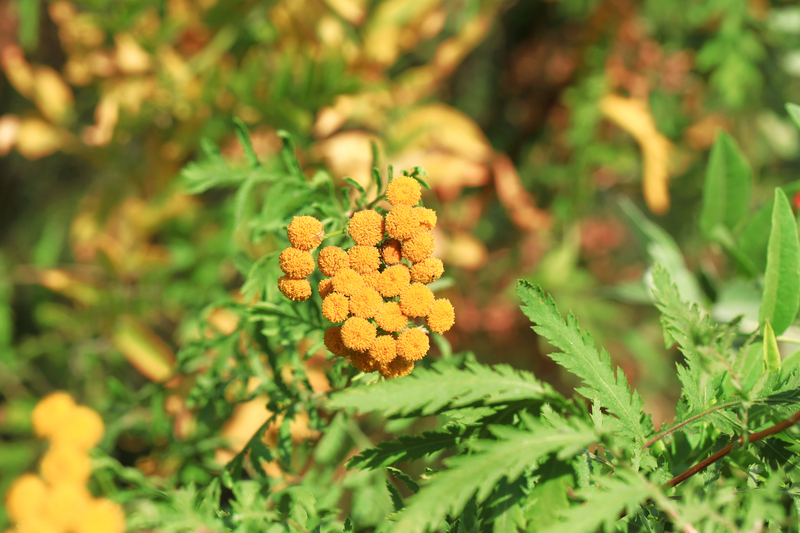Transform Your Backyard with a Beautiful Herb Garden
Posted on 22/06/2025
Transform Your Backyard with a Beautiful Herb Garden
Thinking about making your outdoor space more vibrant, functional, and environmentally friendly? A stunning herb garden can revolutionize your backyard in ways you might not expect. Whether you're a culinary enthusiast, an aspiring gardener, or someone who loves the beauty of nature, creating a backyard herb garden opens the door to a world of freshness, flavor, and tranquility. In this comprehensive guide, you'll discover how to design, plant, and maintain a flourishing herb garden that you'll treasure for years to come.

Why Start an Herb Garden in Your Backyard?
- Freshness at Your Fingertips: Imagine plucking fresh basil, mint, or rosemary just moments before preparing your meals.
- Health Benefits: Many herbs are packed with antioxidants, vitamins, and minerals. Having your own supply ensures you always know where your ingredients come from.
- Eco-Friendly: Growing your own herbs reduces the need for packaged store-bought options, cutting down on plastic and carbon emissions.
- Cost-Effective: A packet of seeds produces an abundance of herbs for months, saving you money compared to store prices.
- Beauty & Biodiversity: Herb gardens are not only functional but also add color, fragrance, and attract pollinators to your backyard.
Planning Your Backyard Herb Garden
Before you grab a trowel and start digging, it's essential to plan your backyard herb garden carefully. A little forethought ensures healthy growth, optimal yield, and a garden that complements your landscape perfectly.
Choosing the Right Location
Most herbs require at least 6-8 hours of direct sunlight daily. Observe your backyard to identify sunny spots and consider accessibility to water.
- Sunlight: Herbs need ample sunlight, so choose a south-facing spot if possible.
- Soil: Well-draining soil is a must. If your yard has clay or compacted soil, consider raised beds or containers.
- Proximity: Plant the garden close to your kitchen for convenience, especially if you plan to harvest herbs regularly.
Deciding What to Grow
Think about the herbs you frequently use in your kitchen and also explore varieties that thrive in your local climate. Here are some versatile, easy-to-grow options:
- Basil: Great for Italian dishes and pestos.
- Mint: Perfect for teas, desserts, and cocktails. Note: Best grown in containers as it spreads quickly.
- Rosemary: Hardy and excellent for grilling.
- Parsley: Adds freshness to a wide range of dishes.
- Thyme: Aromatic and great for roasts and stews.
- Cilantro/Coriander: Essential in many global cuisines.
- Chives: Delicate onion flavor for salads and garnish.
Designing Your Backyard Herb Garden
There's more than one way to design a beautiful herb garden. Consider these approaches to make your backyard both practical and picturesque:
- Traditional Rows or Beds: For orderly planting and easy maintenance.
- Raised Beds: Improve drainage and make gardening easier on your back.
- Herb Spiral: A visually striking, space-saving vertical garden that creates microclimates.
- Container Gardens: Perfect for patios or if you have limited space. Plus, you can move containers to catch the sun.
- Mixed Borders: Integrate herbs with flowers and vegetables for a lush, multi-functional space.
How to Start Your Own Herb Garden at Home
Step 1: Prepare the Soil
Herbs thrive in soil that is well-drained and rich in organic matter. To transform your backyard for herb gardening:
- Remove weeds and debris from your chosen area.
- Loosen the soil to a depth of at least 12 inches.
- Mix in compost or aged manure for added nutrients.
- Test soil pH (most herbs prefer 6.0-7.0) and adjust if necessary.
Step 2: Plant Your Herbs
You can start herbs from seeds or young seedlings. For beginners, seedlings are often easier and faster:
- Follow plant spacing guidelines--most herbs benefit from good air circulation.
- Water seeds or transplants immediately after planting.
- Mulch lightly to retain moisture and suppress weeds.
Step 3: Water and Feed Your Plants
Herbs are naturally resilient, but consistent care leads to the healthiest plants:
- Water deeply but infrequently to encourage deep roots. Let the soil dry slightly before watering again.
- Use a liquid organic fertilizer every 3-4 weeks, but don't overfeed--herbs with too much fertilizer lose flavor.
Step 4: Harvest Regularly
Regular picking encourages your herbs to grow bushier and prevents them from going to seed. Here's how to harvest for maximum freshness:
- Always snip herbs in the morning after dew dries for best flavor.
- Never remove more than a third of the plant at a time.
- Pinch off flower buds to prolong leaf production (unless you want seeds).
Creative Ideas for a Unique Herb Garden
Ready to boost the aesthetic appeal of your herb garden? Implement creative touches for a space that's uniquely yours:
- Theme Gardens: Plant an Italian kitchen garden (basil, oregano, parsley), tea garden (mint, lemon balm, chamomile), or medicinal garden (lavender, calendula, echinacea).
- Vertical Gardening: Use hanging baskets or vertical planters for herbs like thyme, mint, or chives.
- Decorative Containers: Upcycle old teapots, crates, or wooden pallets as rustic planters.
- Edible Borders: Line pathways or flower beds with compact herbs for beauty and easy access.
- Herb Spiral: Build a spiral-shaped mound to maximize space and create microclimates for different herbs.
Caring for Your Backyard Herb Garden Year-Round
With the right care, your herb garden will provide fresh flavor, fragrance, and natural beauty almost all year long. Here's how to keep it thriving:
Spring
- Start seeds indoors or plant seedlings outside after the last frost.
- Feed soil with compost and mulch to retain moisture.
Summer
- Water regularly, especially during dry spells.
- Harvest frequently to encourage new growth.
- Watch for pests--use organic remedies if necessary.
Autumn
- Continue harvesting but slow down as plants prepare to go dormant.
- Dry or freeze extra herbs for winter use.
- Protect perennial herbs with mulch from winter chills.
Winter
- Move tender herbs indoors or to a greenhouse if possible.
- Prune dead growth and plan for next year's expansion.
- Enjoy dried or preserved herbs in your winter cooking.
Maximizing the Benefits of Your Backyard Herb Garden
The possibilities with a homegrown herb garden extend well beyond the kitchen! Explore these great uses and benefits:
- Culinary Delights: Fresh herbs elevate every meal--from salads to marinades, and savory to sweet dishes.
- Herbal Teas: Brew calming teas using your own mint, lavender, or lemon balm.
- Aromatherapy & Wellness: Many herbs offer soothing, calming, or invigorating effects when used in homemade sachets, oils, or baths.
- Attracting Pollinators: Flowering herbs support local bees, butterflies, and other beneficial insects, enhancing your garden's biodiversity.
- DIY Gifts: Bundle and dry your herbs for thoughtful, homemade presents.
Common Challenges (and Solutions) for Growing Herbs Outdoors
Like any gardening project, a backyard herb garden may encounter a few hurdles. Here's how to handle common issues:
Pests
- Attract beneficial insects like ladybugs and lacewings to combat aphids.
- Use neem oil or insecticidal soap for organic pest control.
Diseases
- Prevent fungal diseases by ensuring good air circulation and avoiding overhead watering.
- Remove diseased leaves promptly and dispose of them away from the garden.
Poor Growth
- Test and amend soil as needed for nutrients.
- Ensure herbs are receiving enough sunlight and water, but avoid overwatering.

Frequently Asked Questions About Herb Gardens
- Do I need a lot of space to grow a backyard herb garden?
No! Herbs can thrive in containers, raised beds, or small garden patches. - Can I grow herbs year-round?
Many herbs are perennial, while others can be started indoors or protected in winter to extend their harvest. - How do I dry and store herbs?
Harvest and tie sprigs in bundles, hang them upside down in a cool, dark place, and store in airtight jars once dry. - Which herbs are easiest for beginners?
Basil, chives, parsley, and mint are all forgiving and quick to grow.
Conclusion: Enjoy Your Backyard Transformation
With careful planning, creativity, and a little patience, you can transform your backyard with a beautiful herb garden that will provide lasting rewards. The joy of stepping outside to harvest fresh herbs, the delight in their colors and scents, and the satisfaction of nurturing something from seed to table are just a few reasons to start today. Make your backyard a paradise of flavor, fragrance, and beauty--start your herb garden journey now!
If you enjoyed these tips on designing your own herb garden, share your results and experiences below. Don't forget: a lush herb garden awaits just outside your door!
Latest Posts
Revamp Your Garden with 5 Low-Cost Low Maintenance Ideas
Discover the Secrets of Gardening: 9 Tips for Beginners to Thrive
Transform Your Outdoor Space with 3 Simple Weed Control Tips

